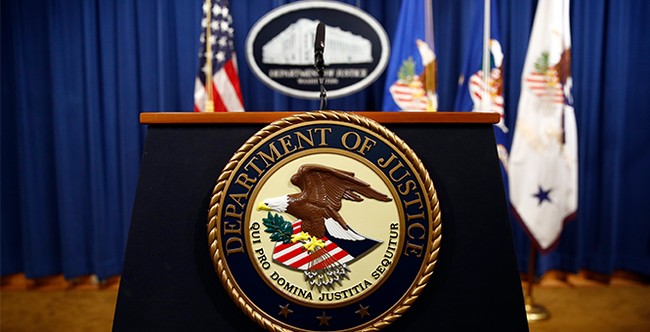We support our Publishers and Content Creators. You can view this story on their website by CLICKING HERE.

On Monday, U.S. Attorney for the District of Columbia Matthew Graves announced his resignation. In a statement, Graves outlined that he will step down from his position at the Justice Department on January 16, just days before President-elect Trump takes office, and is expected to issue pardons for many January 6 defendants.
Advertisement
For many conservatives, this decision couldn’t have come soon enough. Graves, a key figure in the DOJ’s aggressive prosecutions of the January 6 defendants, leaves behind a controversial legacy that many conservatives argue epitomizes the weaponization of the DOJ against political dissent.
Sources tell me DC US attorney Matthew Graves has resigned.
Don’t go too far, buddy.
— Julie Kelly 🇺🇸 (@julie_kelly2) December 30, 2024
Graves was appointed by President Joe Biden and quickly became the public face of the DOJ’s efforts to prosecute those involved in the events of January 6, 2021.
Under a header titled “Defending Democracy,” Graves’ statement says:
“These events triggered the largest investigation in DOJ history. To date, roughly 1,600 people have been charged in connection with the attack with almost 1,100 having already been sentenced for their conduct. There have been over 170 contested trials with the United States prevailing in more than 99% of them. These convictions include the first seditious conspiracy convictions since the trials stemming from the first bombing of the World Trade Center in the 1990s. Because politically motivated violence and destruction rip at the fabric of our society, Mr. Graves made federally prosecuting such crimes a priority.”
Advertisement
By the Numbers
The numbers tell a stark story.
Under Graves’ tenure, the DOJ charged more than 1,600 individuals in connection with the Capitol breach—an unprecedented number for a single event in U.S. history. Graves personally oversaw hundreds of these cases, ensuring that they remained a top priority for his office.
More than 332 defendants were charged with a novel application of “corruptly obstructing, influencing, or impeding an official proceeding,” a charge the Supreme Court threw out in June, per a ruling in Fischer v. U.S.
Supreme Court Hands Down Blockbuster Ruling in Case That Will Impact Multiple J6 Defendants
Over 1,000 defendants have been convicted, with many receiving harsh sentences for non-violent offenses. With prosecutions having resulted in a near 100 percent conviction rate, defendants are statistically more likely to end up dead than exonerated of their charges in court.
A Legacy of Loss
In fact, several defendants did end up dead.
Jord Meachum, Chris Stanton, Mark Aungst, David Kennedy Homol, and Matthew Perna are all deceased defendants who are believed to have taken their own lives. A theme that often comes up in these tragic stories is the DOJs use of terrorism enhancements. Perna is one of those such cases.
Brandon Straka, a founder of the #WalkAway movement, writes about Perna:
Advertisement
Only after pleading guilty did the DOJ inform Matthew that they would seek a TERRORISM enhancement to his sentencing, which would raise his sentence to a potential 9 years in federal prison. 4 days after receiving news that the DOJ would push for this sentencing enhancement, Matthew went into his garage, put a rope around his neck, and hung himself.
In response to Perna’s death, Congresswoman Marjorie Taylor Greene (R-GA) introduced H.R.7540 – Matthew Lawrence Perna Act of 2024.
Rep. Greene wrote:
I introduced the Matthew Perna Act, after Congressman Louie Ghomert left in order to stop political persecution in the justice system. There are no cosponsors. It is a good bill that should have bipartisan support as it allows protestors to get a fair trial.
In announcing the legislation, the Congresswoman took aim at U.S. Attorney Graves, writing:
Matthew Graves has abused the power of his office perhaps more heinously than anyone else in the Biden admin.
I hope he faces consequences for what he has done to these families, along with the judges that handed down extremely unfair sentences.
I am giving the full list of J6 defendants to President Trump. I look forward to their pardons.
In 2023, Rep Greene directly blamed Graves for Perna’s suicide.
She wrote:
Matthew Graves is responsible for the persecution of J6 defendants and the suicide of Matthew Perna, whose only crime was peacefully walking into the Capitol for 20 minutes and walking out.
Advertisement
🚨Newly released footage of Matthew Perna (seen in red sweatshirt) shows Matthew walking calmly in the Capitol shooting video.
Matthew pled guilty to initial charges, believing he may face 6-12 months in prison.
Only after pleading guilty did the DOJ inform Matthew that they… pic.twitter.com/1vu0vrLCFe
— Brandon Straka #WalkAway (@BrandonStraka) November 18, 2023
Meanwhile, incidents of violent riots and property destruction tied to left-wing groups like Antifa have largely gone unprosecuted. This disparity fuels the perception that the DOJ under Graves has prioritized political optics over equal justice.
Credibility Crisis
Perhaps the most telling number attributed to Graves’ legacy is the impact on the psyche of Americans. Confidence in the judiciary is at a record low. Just 35 percent of Americans expressed confidence in the judicial system, according to a Gallup poll released earlier this month, marking a staggering 24-point decline over the past four years.
Read More:
DOJ Tries to Block January 6 Defendants From Trump’s Inauguration, but One Gets Approval
WATCH: Tim Pool Eviscerates Liberal Influencer Jack Beasley in a Must See January 6th Exchange
Graves’ resignation marks the end of a controversial chapter in the DOJ’s history. It’s a reminder of the dangers of allowing federal agencies to become tools of political retribution. The American justice system should be blind to politics, yet under Graves, it was anything but.
Advertisement
Graves leaves us with a monumental task: restoring faith in the DOJ. This will require more than just new leadership—it will require a fundamental shift in how justice is pursued and perceived in this country.
Bridget M. Fitzpatrick, currently serving as the Principal Assistant U.S. Attorney, will assume the role of Acting U.S. Attorney following Graves’ departure.
Editor’s note: While not mentioned by name in this article, this author has a personal friendship with Enrique Tarrio, who was prosecuted by Graves.

 Conservative
Conservative  Search
Search Trending
Trending Current News
Current News 





